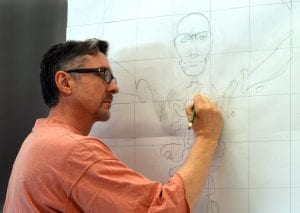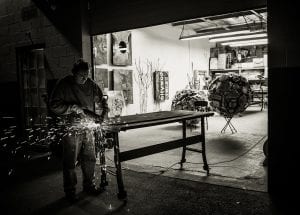Art, it’s a Job

Art doesn’t make itself. It takes planning, time and effort to create. For an artist working alone in the studio, nothing happens unless you make it happen. That seems obvious, but sometimes we need reminding. To help you succeed, here’s some basic tips that I’ve learned over the years.
First, and most importantly, get into the studio everyday. It’s your job. You must be disciplined and apply yourself. When I was a young artist working at ABC in New York, I knew a securities trader who worked out of his home office. It was the early days of the internet and this type of arrangement was unusual. He told me that every morning at 6 a.m. he’d shower and shave, dress in a suit, kiss his wife goodbye, walk into his home office, shut the door and go to “work”. At the time I thought he was crazy and told him if I was in his place I’d be in my underpants. But after working on my own for twenty plus years, I completely understand. It’s too easy not to work when you lack structure and routine.
Don’t procrastinate. When you have a project, a commission, or an idea, pursue it with single-minded determination. Use that initial enthusiasm to get things rolling.
It also helps to break a large project down into a series of smaller manageable steps by writing individual tasks down in a list. For example, get materials, (be specific and list stores or sources), sketch out parts on steel, plasma cut shapes, weld pieces starting at base, etc. There is a great sense of satisfaction crossing items off the list as well as providing an organized plan of attack.
Finish what you start. Try and take each piece to exhibition level completion. By that I mean, finish building it, mount it on a base or frame, apply a patina and sign it. Then record the dimensions and photograph. This will save you precious time when showing or selling the piece. When it leaves the studio you won’t have to scramble getting it ready.
When you’re at the studio, work. Make it a habit. Get into your work clothes and pick up the tools. Try to avoid the computer except for work related correspondence. It’s too easy to be distracted by social media or surfing the net. If you are between projects or waiting for materials, do studio maintenance. There’s always tools that need attention or areas in the studio that could use cleaning and organizing.

Don’t overwork. Working long hours until you are exhausted is counterproductive. I always find it easier and safer to finish up what I’m doing the next morning when refreshed and energetic, rather than slogging through a difficult task at the end of a long day.
Promotion: marketing, website maintenance, show proposals and applications. Working on promotion can be tedious, but success doesn’t come only from working in the studio. Getting eyeballs on your work is essential for publicity and sales. The best way to be visible online is through a well crafted social media campaign that drives viewers to your website. Keeping your website current is important to show potential clients your new work. Nothing is worse than a website that looks like it’s been in mothballs with a copyright date that’s five years old.
Feel free to take a day off. Visit a museum, travel, take a walk, or just plain goof off. As an artist you’re captain of your own ship. Don’t feel guilty about changing course now and then. You’ll be that much more motivated to work after taking a much deserved break.
Waiting for that golden moment of inspiration is a myth. To be successful you must be in the studio working. But if you love what you do, you’ll never work a day in your life.


